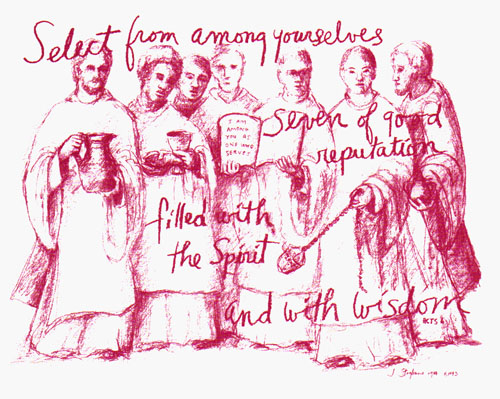Permanent Diaconate
It has been more than fifty years since the restoration of the Permanent Diaconate (Diaconatus Ordinem) in 1967, and forty-six years since the ordination of the first class of permanent deacons in 1975. At that time 77 men were ordained by Archbishop Gerety, considerably reduced from 200 who had applied and the 144 who began the probationary period. Since that time, the permanent diaconate program in Newark has seen many changes as both the theology and the praxis of the diaconate has developed and evolved under the influence of experience and guidance of the Holy Spirit. As in almost all areas of the world where the permanent diaconate has taken root, it has grown and generally has exceeded expectations, not only in the numbers of men called to this ordained ministry, but in the quality of its witness “as icons of Christ the servant.” A listing of significant events in the history of the permanent diaconate in Newark is given in Appendix A from the booklet “A History of 25 Years of Service” presented at the Annual Assembly of Deacons in the Jubilee Year 2000.
Deacon Mentoring Workshop 2016
FAQs
The terms “deacon” and “diaconate” derive from the Greek word diakonia which means “service” or “ministry.” A deacon, then, is ordained by the Church for service. Deacons provide service in three ways:
- Service of the Word — this includes preaching, offering catechetical instruction, spiritual counseling, instructing catechumens, giving retreats, conducting parish renewal programs, and reaching out to alienated Catholics
- Service of the Altar — Deacons’ role in the Eucharist — in addition to proclaiming the Gospel and articulating the Church’s needs in the general intercessions — is to prepare the gifts and distribute communion at the Lord’s table. Deacons may baptize children or adults, witness marriages in the name of the Church, bring Viaticum to the dying, and preside over wakes, funerals, and burial services.
- Service of Charity — is as extensive as are human needs. Deacons minister in prisons and in hospitals. They visit the homebound and people in nursing homes. They serve the mentally ill, the chemically dependent, the abused and the battered, the old and the young, the abandoned, the dying and the bereaved, immigrants and refugees and the victims of racial and ethnic discrimination.
There have been deacons throughout the history of the church. By the time of St. Ignatius of Antioch (+c. 110) the Diaconate was a firmly established order in the Church, along with the orders of bishop and presbyter. There is evidence of deacons even before that in the New Testament (Acts 14:23; 20:17ff; cf. Phil. 1:1; I Pet. 2:25).
If you would like to learn more about the history of the Diaconate call the Office of the Permanent Diaconate at (973) 497-4223
No, the Diaconate is a separate order; they are ordained ministers, but they are not considered Priests.
Important general criteria include an integral Christian faith, personal integrity, maturity, holiness, regular participation in the Church’s sacramental life, and evidence of previous, respected commitment to the Church’s life and service and, for married candidates, a stable family life.
Candidates must:
- Be at least 31 years old and not over 60 at the start of formation
- If married, have the consent of his wife in writing
- If married and a parent, have children that are at least 5 years old
- Be recommended by their pastor
- Have a high school diploma or equivalent
- Be a citizen or a permanent resident of the US
- Have a reasonable grasp of the English language
- Be in good health
- Be a resident of the Archdiocese of Newark, unless a waiver is obtained from the Archbishop
- Show evidence of participation in a parish for a period of 3 years
- Be willing to serve the Archdiocese for a minimum of 3 years
- Have no criminal record (felony)
- If unmarried or widowed, promise celibacy at ordination
For more information call the Office of the Permanent Diaconate at (973) 497-4223
Canon law allows married men to become deacons.
A married applicant must have the full support of his wife in order to continue in his formation for the Diaconate. The wife must give her consent in writing and must show that she will participate to a reasonable extent in formation and post-ordination activities. She, like her husband, must go through an interviewing process.
As part of the interviewing process home visits are conducted to establish if the applicant has a stable family life. Children must be over the age of 5.



